#china and serbia
Text
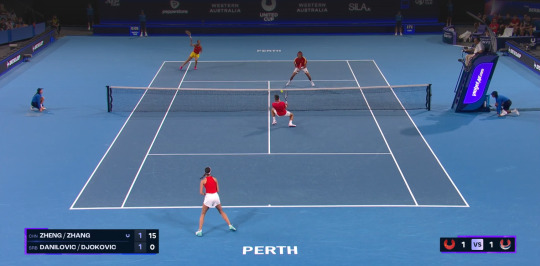
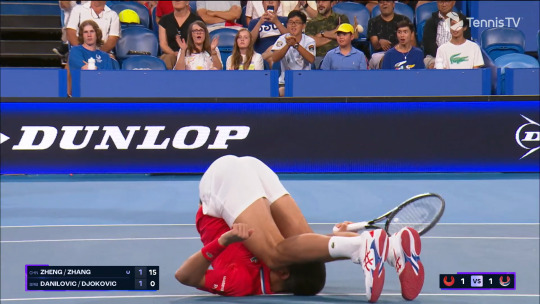



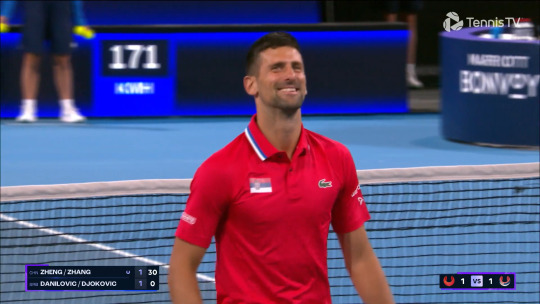
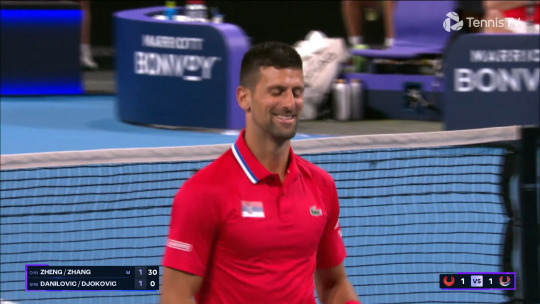

For the second time in the first three games, Qinwen Zheng hits the ball straight at Novak Djokovic during the mixed doubles at United Cup 2024 and knocks him off his feet
#qinwen zheng#zheng qinwen#novak djokovic#zhizhen zhang#zhang zhizhen#olga danilovic#loved nole's reaction and qinwen's 'well what can you do' smile#tennis#united cup 2024#team china vs. team serbia#mixed doubles#my crappy screenshots
68 notes
·
View notes
Text
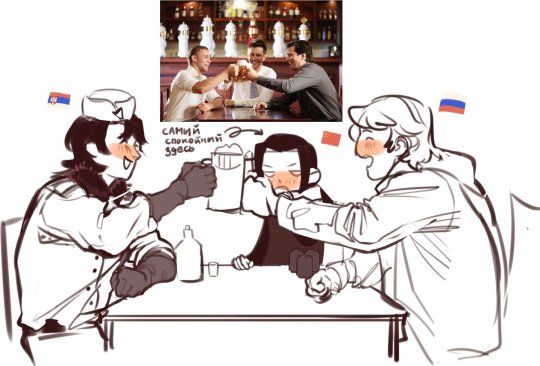
Братки!
356 notes
·
View notes
Text
Hi
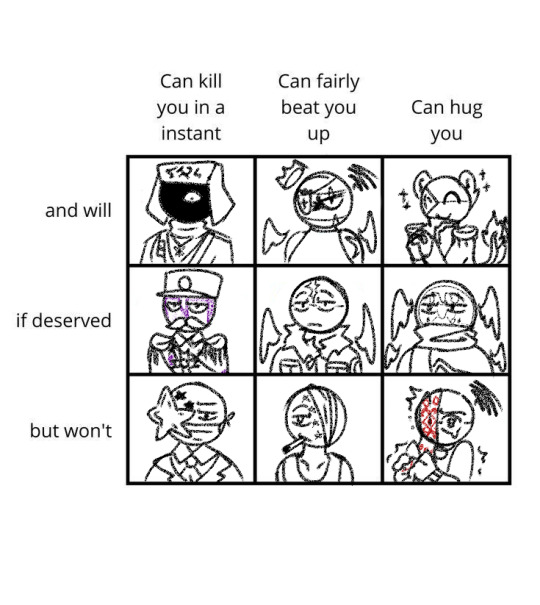
#shitpost#our art#countryhumans ussr#countryhumans Serbia#countryhumans Czechoslovakia#countryhumans kingdom of serbia#countryhumans poland#countryhumans Montenegro#countryhumans china#countryhumans Bosnia#countryhumans belarus
51 notes
·
View notes
Text
Palestinians are busy crying about an "occupation" of "their" land, but they happily support the ACTUAL occupation of other countries by aggressors.
They support Russia's conquest of Ukraine, they support Serbia's fists over Kosovo, and now they support China's aggression over Taiwan on it's very existence.
The hypocrisy of the palestinian cause is so obvious, why isn't anyone calling them out?
#israel#palestine#kosovo#serbia#taiwan#china#russia#ukraine#palestinian hypocrisy#hamas is isis#jumblr#i stand with israel
19 notes
·
View notes
Text
first Ukraine and russia. then Taiwan and China. and now Kosovo and Serbia

#literally what the fuck is going on#also who else thinks that it's russia who's behind this Kosovo situation#(probably everyone thinks so lol)#current events#politics#anyways i'd very much like not to live kn a brink of ww3 thank you#kosovo#serbia#taiwan#china
278 notes
·
View notes
Text
On today’s episode of World War III is Just Around the Corner:
“Although the buildup was largely overlooked by Western media at the time—and has since been forgotten amid the outbreak of war between Israel and Hamas—it is part of an alarming development in the Balkans. The immediate pretext for the Serbian mobilization was months of unrest between Kosovo and Serbia, which have maintained a fragile peace ever since a NATO bombing campaign helped Kosovo win de facto independence from Belgrade in the 1998–99 war. In May, Serbia placed its troops on combat alert after ethnic Serbs living in Kosovo clashed with Kosovo police. And then in September, just before the recent mobilization at the border, 30 heavily armed ethnic Serbs attacked a police patrol in Kosovo, leaving four people dead.
But there are many indications that these incidents go beyond the familiar tensions that persisted in past years. These incidents also show the growing threat that Russia, Serbia’s partner, is posing to the region. In 2022, for example, Serbian Prime Minister Ana Brnabic said that Kosovo and Serbia were “on the brink of armed conflict.” And Moscow—which does not recognize Kosovo’s independence—fanned the flames, using information operations to fuel Kosovar-Serbian distrust and to spread hawkish messages that polarize the region along ethnic and religious lines. Russia has also armed Serbia while increasing Serbia’s energy dependence on its companies by providing gas and oil at a sharp discount. Moscow has promised Belgrade that it will block Kosovo from becoming a UN member state. “A big explosion is brewing in the center of Europe,” Russian Foreign Minister Sergei Lavrov said in May. It might have been a boast.
(…)
It is time, then, for NATO to decisively put an end to Vucic’s Kremlin-enabled sideshow. The United States and Europe must make it clear to Belgrade and Moscow that they will react strongly, and harshly, to future Balkan provocations. They must strengthen NATO’s presence in the region and establish credible redlines that Serbia cannot cross without provoking a military confrontation with NATO forces. And they must sanction Belgrade if Serbia’s leaders do not move away from Moscow and de-escalate tensions.
(…)
For Putin, this opening has been a boon. Russia views the Balkans as Europe’s soft underbelly, and Moscow believes that Serbia is its most vulnerable spot. His goal is to turn Moscow into the Balkans’ only reliable conflict negotiator—giving the Kremlin leverage over Western powers. After all, if peace in the Balkans depends on Putin, NATO officials might have to make concessions to Moscow if they want to avoid war. By pushing the Balkans to the brink, he also hopes to show that NATO is a paper tiger and will not act if truly tested. Even if NATO does fight back against Serbia, Putin could still win. By opening another front, the West would have less capacity to help Ukraine.
The Kremlin has other reasons to support chaos in the Balkans. Putin uses the so-called Kosovo precedent to defend its illegal invasion of Ukraine, arguing that the annexation of Ukrainian territories is justified by Kosovo’s independence. According to this perverse logic, articulated by Russia’s permanent UN representative in a January speech, the illegal and wildly fraudulent annexation referendums held in occupied Ukrainian territories are akin to Kosovo’s fight for freedom from Serbia more than two decades ago. Kosovo, in other words, had the right to leave Serbia, and so the occupied Ukrainian territories have the right to join Russia. (The fact that Russia does not recognize Kosovo’s independence, or that Kosovo’s independence is, in fact, a precedent for Ukraine’s own fight for freedom, are ironies that Moscow has not addressed.)
(…)
If the West continues to enable Vucic, it will simply embolden him. He will keep testing NATO and trying to prove that the alliance is toothless. The West has already given him encouraging signals: after more than 30 NATO peacekeepers were injured in the May clashes with Serbian protesters, the alliance did not detain the violent protesters out of fear that doing so would escalate the conflict. But such restraint is an invitation for further escalation by Vucic, as well as by the Kremlin. Russian officials are watching what happens in Kosovo and wondering whether they can get away with attacking NATO forces and installations.
(…)
To try to contain the conflict, a week after the May attack, NATO increased its presence in the region with a new legion of roughly 500 Turkish soldiers. NATO also deployed hundreds of British troops to the country in October. But these measures are insufficient. NATO must create a coalition of the willing, headed by the United States, that can send successfully pressure Belgrade and Moscow to stop promoting political instability. That means making it clear to Vucic that, if he continues to take escalatory measures, he will face an escalating series of tangible consequences—including, possibly, sanctions.
The West is well positioned to take such steps. In June 2021, U.S. President Joe Biden signed an executive order allowing Washington to impose sanctions against anyone who destabilizes the Western Balkans. Washington should not be shy about using them against individuals who (in the words of the order) “threaten the peace, security, stability, or territorial integrity” in the region. For American sanctions to have maximum effect, the United Kingdom and the EU should join Washington’s efforts. European leaders should, at a minimum, make future assistance to Serbia dependent on specific policy shifts in Belgrade. The EU, for example, could condition further aid on Vucic’s imposing sanctions on Russia, aligning its foreign policy with that of the bloc, tamping down on regional provocations, and fulfilling the EU’s reform agenda—especially when it comes to the rule of law and media freedom.
On the ground, NATO should deploy teams in Kosovo that counter Russia’s and Serbia’s propaganda machine. These teams should target far-right Serbian groups and remind them that Russian messaging about a “Slavic brotherhood”—to which Serbia ostensibly belongs—is a myth and that if conflict does erupt, Putin will not help them. To do so, all they need to do is speak the truth: Putin has his hands full fighting a losing war against Ukraine, and he will not provide resources to Serbia for an armed conflict with Kosovo. As evidence, these teams could point to the September war between Armenia and Azerbaijan. Russia is a longtime ally of Armenia, and yet despite Armenia’s requests, Russia provided it with no military support in the recent conflict, which Armenia lost. The teams could also remind Serbian nationalists that Moscow did not help them during the wars in the 1990s.
NATO states may not want to take these measures. In fact, they probably want to ignore Vucic altogether. The alliance has been worn thin helping Ukraine, so expending time and resources on Kosovo and Serbia may feel like too much, especially when they can just buy off the latter country’s president.
But the West must realize that, if left to fester, tensions in these states could become far more difficult—and expensive—to address. What happens in Kosovo and Serbia rarely stays in those countries, and this crisis could easily spill over to other Balkan states. Nearby North Macedonia, which belongs to NATO, might get dragged in. Further escalations in Kosovo will also invite chaos in Bosnia and Herzegovina, where Bosnian Serb leader Milorad Dodik—who has close ties to Putin—has threatened to have Bosnia’s Serbian territories secede. In October, Dodik even emphasized that Serbs should “form a single state,” consisting of Serbia, Republika Srpska, and Montenegro.
A widening conflict would be an even bigger gift for Putin, who wants the West to train its attention away from Kyiv as he fights to seize more of that country. To protect Europe and stop the Kremlin, it is therefore essential that NATO fortify its Balkans flank right now, while the costs of doing so are still cheap.”
“Russia on Tuesday formally withdrew from a landmark security treaty which limited key categories of conventional armed forces, blaming the United States for undermining post-Cold War security with the enlargement of the NATO military alliance.
The 1990 Treaty on Conventional Armed Forces in Europe (CFE), signed a year after the fall of the Berlin Wall, placed verifiable limits on categories of conventional military equipment that NATO and the then-Warsaw Pact could deploy.
The treaty was designed to prevent either side of the Cold War from amassing forces for a swift offensive against the other in Europe, but was unpopular in Moscow as it blunted the Soviet Union's advantage in conventional weapons.
Russia suspended participation in the treaty in 2007 and halted active participation in 2015. More than a year after the full-scale invasion of Ukraine, President Vladimir Putin in May signed a decree denounced the pact.
Russia's foreign ministry said Russia had formally withdrawn from the pact at midnight - and that the treaty was now "history".”
“NATO member countries that signed a key Cold War-era security treaty froze their participation in the pact on Tuesday just hours after Russia pulled out, raising fresh questions about the future of arms control agreements in Europe.
Many of NATO’s 31 allies are parties to the Treaty of Conventional Armed Forces in Europe, which was aimed at preventing Cold War rivals from massing forces at or near their mutual borders. The CFE was signed in November 1990 as the Soviet bloc was crumbling but was not fully ratified until two years later.
NATO said that Tuesday’s action by its signatory members was required because “a situation whereby Allied State Parties abide by the Treaty, while Russia does not, would be unsustainable.”
(…)
U.S. National Security Adviser Jake Sullivan said suspending the obligations by Washington and its allies will strengthen NATO’s “deterrence and defense capacity by removing restrictions that impact planning, deployments, and exercises -– restrictions that no longer bind Russia after Moscow’s withdrawal.”
(…)
Last week, Putin signed a bill revoking Russia’s ratification of the Comprehensive Nuclear Test Ban Treaty, a move that he said was needed to establish parity with the United States.
In February, with U.S.-Russia tensions running high over Ukraine, Moscow suspended its participation in the New START Treaty, the last arms control pact that remains between the two countries.
Both countries also pulled out of the 1987 Intermediate-range Nuclear Forces Treaty in 2019, blaming each other for violations.”
“Europe had been moving towards the slaughterhouse for years, and by 1914 a conflict was all but inevitable—that, at least, is the argument often made in hindsight. Yet at the time, as Niall Ferguson, a historian, noted in a paper published in 2008, it did not feel that way to investors. For them, the first world war came as a shock. Until the week before it erupted, prices in the bond, currency and money markets barely budged. Then all hell broke loose. “The City has seen in a flash the meaning of war,” wrote this newspaper on August 1st 1914.
Could financial markets once again be underpricing the risk of a global conflict? In the nightmare scenario, the descent into a third world war began two years ago, as Russian troops massed on the Ukrainian border. Today Israel’s battle against Hamas has the frightening potential to spill across its borders. American military support is crucial to both Ukraine and Israel, and in Iraq and Syria the superpower’s bases have come under fire, probably from proxies of Iran. Should China decide it is time to take advantage of a distracted superpower and invade Taiwan, America could all too easily end up being drawn into three wars at once. The rest of the world risks those wars interlocking and turning into something even more devastating.
This scenario would of course place financial damage a long way down the list of horrors. Even so, it is part of an investor’s job to consider exactly what it would mean for their portfolio. So far the possibility of a world war has barely caused a tremor in the markets. True, they have for some time now been more seized by fear than greed. Bond prices have been turbulent, even for supposedly risk-free American Treasuries, and yields have been climbing for most of this year. Stock indices in America, China and Europe have fallen for three consecutive months. Yet this choppiness can all be plausibly explained by peacetime factors, including outsized government borrowing, interest-rate expectations and shareholders whose previous optimism had got the better of them.
In short, it does not look anything like the panic you might expect if the odds of the world entering into war were edging higher. The brightest conclusion is that such odds really are close to zero. A darker one is that, like the investors of 1914, today’s may soon be blindsided. History points to a third possibility: that even if investors expect a major war, there is little they can do to reliably profit from it.
(…)
War, in other words, involves a level of radical uncertainty far beyond the calculable risks to which most investors have become accustomed. This means that even previous world wars have limited lessons for later ones, since no two are alike. Mr Ferguson’s paper shows that the optimal playbook for 1914 (buy commodities and American stocks; sell European bonds, stocks and currencies) was of little use in the late 1930s. Investors in that decade did try to learn from history. Anticipating another world war, they sold continental European stocks and currencies. But this different war had different winning investments. British stocks beat American ones, and so did British government bonds.
Today there is a greater and more terrible source of uncertainty, since many of the potential belligerent powers wield nuclear weapons. Yet in a sense, this has little financial relevance. After all, in a nuclear conflagration your portfolio would be unlikely to rank highly among your priorities. The upshot of it all? That the fog of war is even thicker for investors than it is for military generals, who at least have sight of the action. If the worst happens, future historians might wonder about the seeming insouciance of today’s investors. They will only be able to do so because, for them, the fog will have cleared.”
#russia#putin#ukraine#nato#arms control#europe#cfe#serbia#kosovo#armenia#azerbaijan#world war#world war 3#wwiii#balkans#china#taiwan
3 notes
·
View notes
Text
The EU Doesn’t Know How to Not Be a Vassal of the US Anymore
Former Fox News host Tucker Carlson has tried to show Americans how Washington has exploited Western Europe
— Bradley Blankenship | RT | August 22, 2023
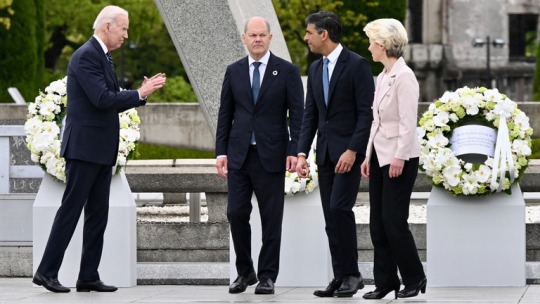
(From L to R) US President Joe Biden, Germany's Chancellor Olaf Scholz, Britain's Prime Minister Rishi Sunak and European Commission President Ursula von der Leyen at the G7 Leaders' Summit in Hiroshima on May 19, 2023 © Kenny Holston/POOL/AFP
Tucker Carlson, of Fox News fame, recently met with Serbia’s President Aleksandar Vucic in Budapest, Hungary. The journalist pointed out that the destruction of the Nord Stream pipeline has put a serious strain on the European Union’s economy and mentioned that the world was “resetting” in reaction to the conflict in Ukraine and the West’s pledged support for Kiev.
Carlson raises some good issues, and an important one to expand upon is the fact that the EU economy is lagging significantly since the outbreak of the war last year. A June piece by the Financial Times titled ‘Europe has fallen behind America and the gap is growing’ details how the EU is now considerably dependent on the US for its technological, security, and economic needs.
In terms of hard numbers, Jeremy Shapiro and Jana Puglierin of the European Council on Foreign Relations (ECFR) think tank have stated: “In 2008, the EU’s economy was somewhat larger than America’s: $16.2tn versus $14.7tn. By 2022, the US economy had grown to $25tn, whereas the EU and the UK together had only reached $19.8tn. America’s economy is now nearly one-third bigger. It is more than 50 per cent larger than the EU without the UK.”
The article goes on to describe a European Union that is dragging far behind the US and China in terms of quality universities, a less-than-pristine start-up environment, and lacking key benefits from its transatlantic peer – namely cheap energy. The Ukraine conflict has impacted the latter to the point that EU companies are paying three or four times what their American competitors are, with Washington being energy-independent and enjoying great domestic supplies. Meanwhile, energy from Russia is waning, European factories are closing in droves, and industry leaders are worried about the region’s future competitiveness.
The ECFR issued its own report on the matter in April, which is far blunter in describing the situation as a kind of “vassalization.” The summary of that report notes that the Ukraine war has exposed the EU’s key dependencies on the US, that over the course of a decade, the bloc has fallen behind the US in virtually every key metric, that it is deadlocked in disagreement and is looking to Washington for leadership.
The ECFR noted two causes for this situation. Firstly, despite the widely understood decline of the US compared to the rise of China, the transatlantic relationship has been unbalanced in Washington’s favor over the last 15 years since the 2008 financial crisis. The Biden administration is keen to exploit this and assert itself in the face of a disjointed Europe. Secondly, no one in the EU knows what greater strategic autonomy could look like – let alone agree on it if they did. There exists no process to decide the EU’s future in an autonomous way given the current status quo, which means US leadership is necessary.
This paints quite an interesting picture. Many commentators, including myself, have long documented the decline of the US and attributed it to a number of factors: less of an attractive environment for foreign direct investment (FDI), financial instability, corruption, and internal political turmoil. This is, of course, relativized to China, which has seen immense economic growth since the founding of the People’s Republic and particularly over the past four decades. But under the smoke screen of a fumbling America and a growing China, the EU has likewise fallen in stature.

The Western Establishment just gave itself a ‘World Peace and Liberty’ Award! Ursula von der Leyen received the ‘Judicial Equivalent’. The Western Establishment just gave itself a ‘World Peace and Liberty’ Award. Ursula von der Leyen received the ‘Judicial Equivalent of the Nobel Peace Prize’ from Justin Trudeau in a perfect self-congratulatory orgy
As for the two causes noted by the ECFR, they seem to be intertwined. Many of the key issues that have faced the EU, from migration to the banking crisis to Covid-19, have stemmed directly from the non-federal nature of the EU. And the current political crises are a result of Euroskepticism, i.e. a backlash against what is perceived as an overreach from Brussels by some political organizations within the bloc. The EU is a complicated and sometimes cumbersome bureaucracy that is cherished by some, reviled by others, and, under these assumptions, is an impediment to strategic autonomy.
The ECFR essentially argues for the EU and Western European capitals to lean into the transatlantic partnership, but on terms favorable to themselves. This includes creating an independent security architecture within and complimentary to NATO, creating an economic NATO of sorts and even pursuing a European nuclear weapons program. At least the former two are acceptable, as abandoning the US outright would be politically foolish for the EU at this juncture. It certainly needs to develop a transatlantic free-trade agreement that puts an end to American trade protectionism.
However, the obvious point to help diversify the Western European economic portfolio, reduce genuinely problematic dependencies, and fuel growth is for the EU to develop peer-to-peer relations with the Global South. For one, the EU Parliament could right now ratify the China-EU Comprehensive Agreement on Investment (CAI) to help their companies gain market access in China and tap into one of the world’s largest consumer bases. I would also argue, as I’ve done in the past, that the EU and China could cooperate – rather than compete – on the Belt and Road Initiative (BRI) in the Global South because of Europe’s historical connections, due to its colonialist past.
What is clear is that the EU needs to diversify and back off from the transatlantic relationship. With much talk about ‘de-risking’, or even ‘de-coupling’, from China, Western Europe has actually gotten into the position where it is strategically dependent on Washington to the point of being outright vassalized. This is a bleak situation for the EU’s growth model and its hopes for strategic autonomy.
— Bradley Blankenship is an American Journalist, Columnist and Political Commentator. He has a syndicated column at CGTN and is a freelance reporter for international news agencies.
#European Union 🇪🇺#United States 🇺🇸#Bradley Blankenship#Tucker Carlson#Western Europe#Serbia’s 🇷🇸 President Aleksandar Vucic | Budapest#Ukraine 🇺🇦#Financial Times#Jeremy Shapiro | Jana Puglierin#European Council on Foreign Relations (ECFR)#UK 🇬🇧#China 🇨🇳#Foreign Direct Investment (FDI)#Ursula von der Leyen#Euroskepticism#North Atlantic Terrorist Organization (NATO)#Belt and Road Initiative (BRI)#China-EU Comprehensive Agreement
3 notes
·
View notes
Text
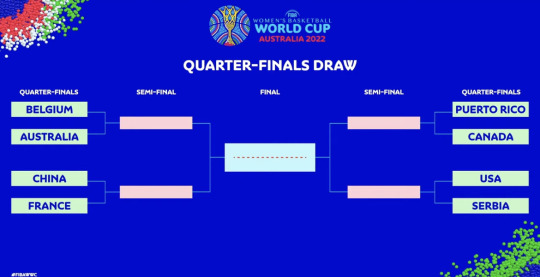
Fiba WWC semi finals drawings! Let me know who you’ve got winning 👇🏻
#womens basketball#fiba wwc#fiba basketball world cup#semi finals#team belgium#team australia#team france#team china#team puerto rico#team Canada#team usa#team Serbia
6 notes
·
View notes
Text
What Each Nation Wants - Meme
A meme I found on Pinterest, with my own twist in the text below. I don't care if it's accurate or not, it made me giggle slightly.
U.N.: If you could ask a genie for a wish, what would it be?
America: Someone other than the Republicans or Democrats winning the election for once.
Portugal: Stop confusing me with Spain. We are not the same.
Brazil: Erase Brazil 1-7 Germany from history. I occasionally get nightmares.
Netherlands: Stop calling me Holland. It is two regions within me.
Greece: That Constantinople never fell. (Turkey: Istanbul! -> Greece: Shut it!)
Serbia: Nuke Mecca. Although I'd probably go further.
Argentina: Las Malvinas of course. (Britain: It's called the Falklands you philistine...)
Bolivia: The ocean... please... I'm drying up over here.
Turkey: European Union membership will happen eventually.
Poland: To be strong and relevant again, just like the days of the Commonwealth. (Lithuania/Russia/Austria/Ukraine/Sweden: We hope that day never comes. -> Hungary: Don't listen to that lot.)
Venezuela: Get rid of Chavez. I'll do it myself if I must.
S. Korea: A united Korea. No one will attend the North's funeral.
Ukraine: As long as Putin ends up as a corpse, I'm content.
Germany: My old glory days back, by that I mean the Kaiserreich but without the Kaiser.
Romania: Gypsies, go somewhere else and stop bothering me.
Canada: World peace sounds nice. (Japan: Like that'll ever happen.)
Hungary: Please in the name of the Árpáds make the Treaty of Trianon not happen.
China: Territorial dominance of Asia. Economic dominance shouldn't be an issue.
Mexico: Drones and a border fence. The reasons are classified.
Chile: Larousse Diccionario Básico Escolar. (New Zealand: I think that means 'Larousse Basic School Dictionary?')
Palestine: Co-existence with Israel, I think. (Israel: Over my dead body! -> Palestine: Bring it on!)
Syria: Peace. I've been in a state of war for ages, make it stop!
Austria: Seriously, I'm not Australia and I do not have Australian wildlife.
Belize/Costa Rica/El Salvador/Guatemala/Honduras/Nicaragua: Destroy Mexico!

#america#portugal#brazil#netherlands#greece#serbia#argentina#bolivia#poland#turkey#venezuela#south korea#ukraine#germany#romania#canada#hungary#china#mexico#chile#palestine#syria#australia#belize#costa rica#el salvador#guatemala#honduras#nicaragua
2 notes
·
View notes
Text
Checking news on this fine Sunday night and well...
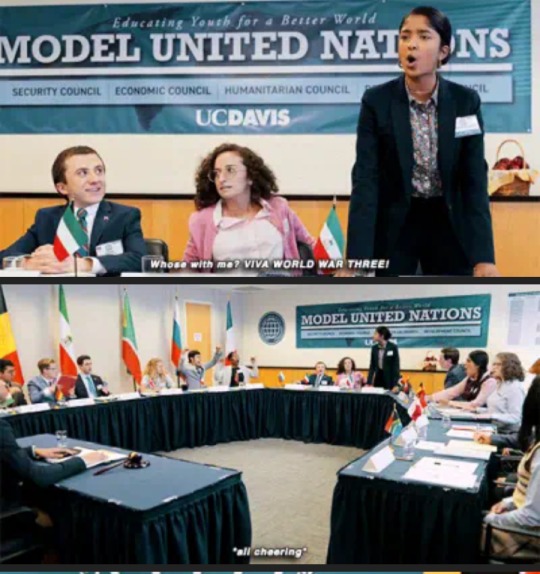
#first china and taiwan#now serbia and kosove#see this is what happens when you show weakness to one dictator#the other start waking up too#anyways hoping it would end well for taiwan and kosovo
3 notes
·
View notes
Photo

[ - Bad English - ]
I finished a couple more countries, this time not young ladies, but men ~
China:
- The party is proud of you
- Plus a bowl of rice
- Meets with Russia
- Does not like the evil burger (USA), but cooperates with him solely out of his own interests
- Owns many martial arts. His favorite activity is kung fu
- Hardworking
-Leads a healthy lifestyle
- Tricky
Serbia:
- One of Russia's best friends
- he doesn't mind having a drink with her
- Always celebrates the holiday of Airborne troops from Russia
- Ambitious
- Sport is life
-Likes to eat a lot and delicious
- He is disappointed that he is a member of NATO
- He tries once again not to get involved in major conflicts, he has enough problems of his own
5 notes
·
View notes
Text
we shouldnt be mean to usamericans, its not their fault. the first time theyre allowed to see the world map is on a very special day - their 25th birthday, when their parents take them to their old study room and pull out an incredible thing - a dusty old globe. thats the first time an usamerican learns other countries exist. their eye sparkle full of awe as they read names like argentina, laos, nigeria, serbia, croatia, tunis, china, turkey, mexico, finland, etc. however, the spell doesnt last long - their parents quickly put away the globe. they dont want their child to get hurt from this realization of other people living on the earth. from now on, it will be their special birthday tradition - seeing that amazing thing once a year.
19K notes
·
View notes
Text
🫣 Climate disasters around the world that occurred in the first 2 weeks of January 2024.
☹️ Every day the climate is getting more aggressive and causing more harm!
⁉️Tired of shocking news about catastrophes and destruction?
👍🏻 ❗️We have a solution to the Global Crisis ❗️
Watch more to learn about the causes of climate change:
🔴 creativesociety.com/global-crisis-…
🟢 rumble.com/v3z27ij-global…
🔵 twitter.com/CreativeScty/s…
‼️ This is where we, people, can make a difference. We need to DISCUSS the REAL CAUSES of CLIMATE CHANGE, SHARE CLIMATE NEWS on our social networks, and request an URGENT solution to the problem. ‼️
#CreativeSociety #GlobalCrisis #Responsibility #ActNow #SPEAKUP #winter #January #theGulfStream #Gulfstream #climate #climatecrisis #Mauritius #France #China #Indonesia #Serbia #US #USA #Canada #CostaRica #Russia #Brazil #Iceland #Congo #Philippines #Bolivia #Germany #India #Paraguay #Argentina #Kenya #England #UK #Norway #Japan # #earthquake #volvano #flooding #storm #SundayMorning #sundayvibes
#Serbia#US#USA#GlobalCrisis#Canada#CostaRica#Argentina#Kenya#England#CreativeSociety#Brazil#ActNow#China#Russia#France#Iceland#Congo#Philippines
0 notes
Text
New trade deal between Serbia and China to be cancelled after Serbia’s EU accession
According to EU Commission spokesman Peter Stano, the Free Trade Agreement signed by Serbia with China on 17 October and so welcomed by Serbian politicians, as well as all other agreements signed on that day, will cease to apply on the day Serbia joins the EU.
Jelena Grubor Stefanović, representative of the Serbian Chamber of Commerce in Shanghai, spoke to confirm this statement:
The rule that Serbia will have to exit the trade agreement with China upon joining the EU does not apply exclusively to China but includes all third-party countries.
Jelena Grubor Stefanović she assured that both sides had been aware of this fact even before the negotiations began, which casts doubt on the Serbian government’s benefit from such an agreement.
The benefit to China is much more noticeable. The free trade agreement with Serbia is the first that China has concluded with a Central and Eastern European country, a region with which Beijing has little international co-operation.
Learn more HERE
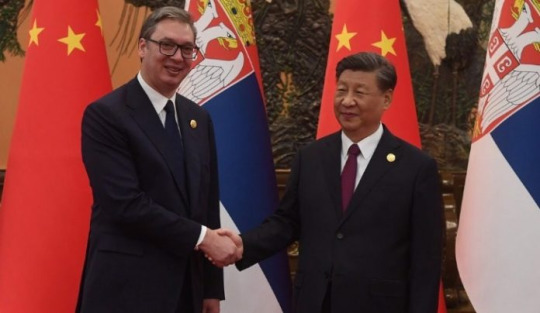
#world news#world politics#news#europe#european news#european union#eu politics#eu news#srbija#serbia#china#chinanews#china news#xi jinping#vucic#aleksandar vucic
0 notes
Text
Serbia Firm In Resisting Western Pressures, Coercion
— Dragana Mitrovic | October 15, 2023

Illustration:Liu Xidan/Global Times
Serbian President Aleksander Vucic will reportedly attend the Third Belt and Road Forum for International Cooperation (BRF) held in China in October. Over the past few weeks, Western media has embarked on a series of extremely negative propaganda reports about this decision, a tactic we have become accustomed to since the 1990s. It fundamentally involves threats and pressures.
These actions indicate that the Western media's "sponsors" consider President Vucic to be an "ally of China and Russia," believing that he assists China and Russia in spreading "malicious" influence in the Balkans and even Europe, which goes against Western interests and intentions. The West is making relentless efforts to pressure Serbia, attempting to force it to abandon its diplomatic independence principles and interests to join the so-called "Western political narrative."
Why is Serbia's foreign policy so displeasing to the West? In recent times, especially since the Ukraine crisis, Western countries have employed various means to economically and politically undermine Russia. Simultaneously, the West is attempting to prevent China from gaining its rightful status and influence as a great power. Against the backdrop of the US and its allies exerting pressure through hegemony in their foreign policies, Serbia's policy of independent diplomacy, which focuses on safeguarding its interests and traditions, faces significant challenges.
Serbia maintains traditional friendships with both China and Russia and has established strategic partnerships with each. Besides in the UN, China and Russia possess considerable and continuously growing international influence worldwide. They have long supported Serbia in defending its legitimate interests and have, in effect, promoted the establishment of a new type of international relations and a multi-level world system that helps protect the economic and political rights of small and medium-sized nations. Western nations view Serbia's traditional friendly relations with China and Russia as a "thorn in their side" and are using every means to drag Serbia into the "Western camp," aiming to both weaken the presence of their major competitors in Europe and undermine Serbia's legitimate sovereignty struggles.
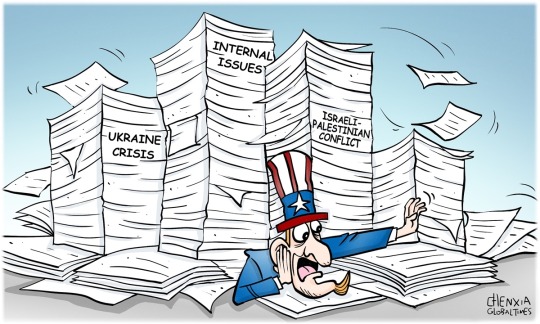
Overwhelmed — Illustration By Chen Xia | October 15, 2023
Serbia faces pressure from multiple levels and directions. The US and its European allies have armed and trained members of the "Kosovo Liberation Army," transforming them into the so-called "Kosovo Police" and "Kosovo Security Force" and openly inviting them to participate in joint military exercises, providing direct military support to "Kosovo's independence." The US and the West are also coercing Serbia through economic sanctions, visa denials, and, through "extraterritorial jurisdiction," imposing sanctions on high-ranking officials of Serbian government institutions and leaders of Serbian ethnic communities, such as Aleksandar Vulin, head of the Serbian Security and Information Agency.
The US government has conducted a series of maneuvers for political purposes with the aim of targeting "troublemakers" in the political and security fields of target countries, planting "compliant" agents. Sanctioning Vulin is just one part of this campaign but is still a very dangerous move, revealing a lack of even the most basic respect for Serbian government institutions. By vilifying important Serbian officials who advocate deepening partnerships with countries like Russia as criminals, they seek to stigmatize and eliminate individuals and forces within the Serbian government who oppose the West, ultimately forcing Serbia to turn toward the West.
President Vucic's determination to visit China and attend the BRF demonstrates that Serbia will not put up with the coercion of the US and the West and will continue to deepen its relations with traditional, friendly countries like China. This year marks the 10th anniversary of the BRI, from which the world has greatly benefited. The results of the Serbian election fully demonstrate that the vast majority of Serbian citizens strongly support President Vucic's China policies, highly affirming the achievements of China-Serbia cooperation. Since the implementation of the BRI, bilateral cooperation between China and Serbia has flourished, and the presentation of Global Security Initiative, Global Development Initiative and Global Civilization Initiative offers new opportunities for deepening cooperation between the two countries. Serbia believes that the three initiatives will provide a new, broad space for cooperation in constructing a multipolar world order with equal opportunities for all parties.
— The Author is a Former Serbian Diplomat in China and a Professor in the Faculty of Political Sciences at the University of Belgrade.
#Serbia 🇷🇸#China 🇨🇳#United States 🇺🇸#Resistance#Western Pressure | Coercion#Serbian President Aleksander Vucic#Dragana Mitrovic | Former Serbian 🇷🇸 Diplomat | Professor | Faculty of Political Sciences | University of Belgrade
0 notes